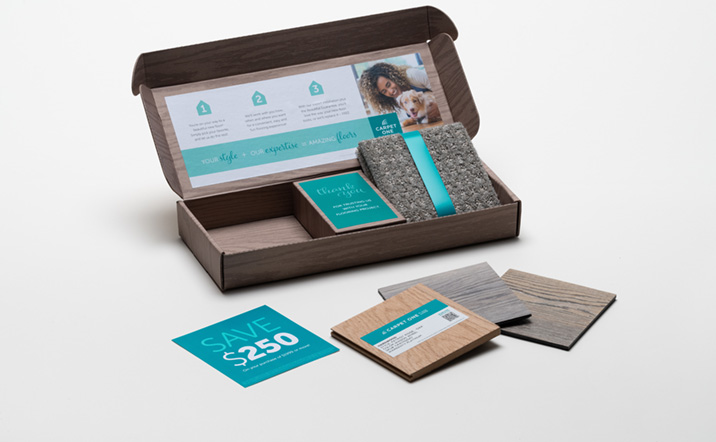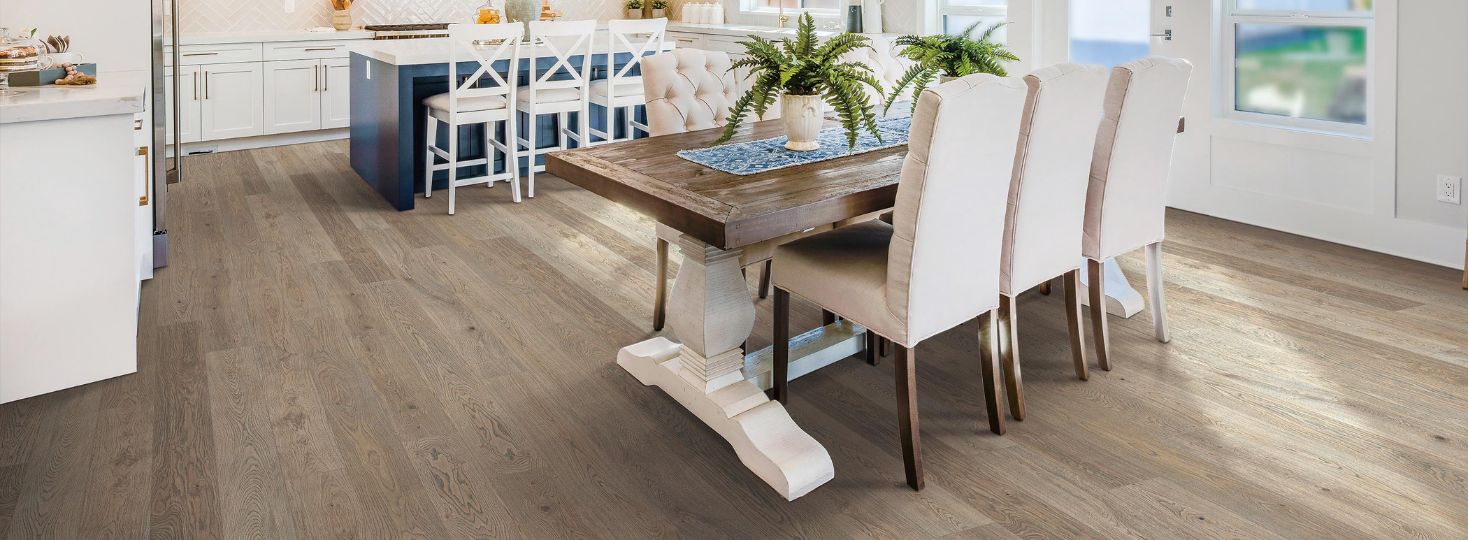
Waterproof Wood Flooring
Waterproof wood floors withstand moisture and protect subfloors through genuine hardwood veneers with innovative engineered cores.

Waterproof wood floors withstand moisture and protect subfloors through genuine hardwood veneers with innovative engineered cores.

Our designers share tips and top trends for every season. Discover your next home project with the help of our blog.

Get up to six samples delivered to your door.

What sets waterproof hardwood apart? In a word, everything. This uniquely designed flooring solution takes the best of traditional hardwood and supercharges it with cutting-edge technology, delivering a luxuriously stylish and incredibly resilient solution that can brave any room in your home. Composed of enhanced cross layers of wood with a real wood veneer on top, these floors, also known as engineered hardwood, are designed with a waterproof core that makes them impervious to liquid.
Waterproof wood flooring confidently withstands moisture and protects the subfloor by combining a genuine hardwood veneer with an innovative engineered core, similar to that commonly seen in luxury vinyl. These manmade inner layers, along with a UV aluminum oxide finish, resist water indefinitely and keep the subfloor underneath safe and dry. This means you don’t have to worry about water damage from life's mishaps.
Waterproof hardwood floors operate differently from solid hardwood floors, which absorb liquid into the fibrous wood, causing buckling and warping. Laundry rooms, kitchens, bathrooms, and mudrooms can benefit from the long-term protection of the best waterproof floors.
Waterproof hardwood flooring looks like genuine hardwood because the top layer is genuine hardwood. Since engineered hardwood still includes an authentic wood veneer, you can find waterproof wood flooring products ranging from light white oak with a prominent grain pattern to the subtle graining of hickory. Available in an array of designs, including sleek, modern, cozy, and rustic, you'll find the perfect match for your home's interior, all without compromising on performance or longevity.
Waterproof flooring is designed to repel water for the life of the floor. The planks' impenetrable layers ensure liquids stay on the surface for easy cleanup, so you don’t have to worry if you didn’t immediately discover your puppy’s accident.
Routine maintenance is fairly straightforward. Regular sweeping or vacuuming without a beater bar can help prevent dirt and debris from scratching your hardwood’s veneer. An occasional mop is a good idea when you're ready for a deeper clean or have an area needing more attention. As always, read the manufacturer's care instructions for information specific to your home's flooring.
Everyday accidents are inevitable, but with waterproof hardwood, they don’t have to be disastrous. Quick solutions for common spills include promptly wiping up liquids with a dry or slightly damp cloth to prevent any moisture from seeping into the seams. For sticky or stubborn spills, use a manufacturer-approved cleaner and a soft cloth to gently clean the area without damaging the finish. Preventative measures such as placing absorbent mats in high-risk areas like kitchens and entryways, and using coasters and placemats under beverages and hot dishes, can further protect your flooring.
Engineered wood floors, including waterproof versions, are designed to last a couple of decades at least. The life of the waterproof wood floors in your home will depend on several factors, including:
To ensure you get the most from your new waterproof hardwood, look for warranty protection and always follow the manufacturer guidelines for your specific flooring.
Engineered hardwood flooring can be installed in a few ways. An installer can adhere the planks to the subfloor by gluing, nailing, or stapling them down. Or it can be a floating floor installation, connecting the interlocking joints of the tongue-and-groove engineered wood planks over the subfloor with little to no adhesive.
Rest assured that your flooring is installed correctly when you hire a professional flooring installer. We know that people love DIY flooring projects, but some things are best left to the professionals. A proper installation will ensure that your waterproof flooring functions just as it's intended to and for as long as it should. Be sure to ask your trusted installation professional about flooring warranties as well.
The name says it all when it comes to the biggest advantage of waterproof flooring: it’s waterproof.
Other advantages include:
With all the pros of waterproof wood flooring, it's important to note the few disadvantages:
Due to its innovative design, waterproof hardwood thrives in spaces where traditional wood floors fear to tread. From steamy bathrooms to bustling kitchens, it’s a stylish solution for any room in your home. This advanced flooring technology is particularly beneficial in high-moisture areas like laundry rooms and basements, where humidity and spills are common.
From minimalist modern to rustic farmhouse, waterproof hardwood adapts to almost any design aesthetic. Installing a wide-plank water-resistant wood flooring in a light neutral tone like ash or white oak can easily create a cohesive and stylish look. Pair it with minimalist furniture and clean lines for an airy, uncluttered space. Or, if you're looking for more charm, choose waterproof hardwood with a distressed wood finish to add character and warmth. Shades of warm brown or grey can enhance this rustic appeal and combined with natural wood furniture or exposed beams, you can achieve a cozy, lived-in atmosphere.
By understanding the unique demands of your space, you can make informed decisions and select the most suitable product to ensure stylish and durable wood floors for years to come.
There's no waterproof solid hardwood that comes straight from the mill. But, there are waterproof wood flooring options! These products combine a top layer of real hardwood with engineered core layers that resist moisture.
Solid hardwood flooring alone is not waterproof. All wood species react to moisture, some more than others. But you can have the look of a genuine hardwood floor with waterproof wood flooring, which combines a hardwood veneer with engineered layers to create an impermeable surface that protects your floors and repels liquids to preserve the subfloor beneath.
Sometimes waterproof hardwood flooring is referred to as engineered hardwood flooring, and manufacturers have trademarked names to represent their proprietary versions. Carpet One adds a waterproof icon to all waterproof styles to make these premium hardwood options easy to find.
Porcelain tile is 100% waterproof thanks to its naturally low absorption rate, which is why you might find it in outdoor settings. Luxury vinyl tile is a close second with waterproof tiles, but they can still be damaged if moisture penetrates the seams and seeps down to the subfloor. If you want a waterproof hardwood look, consider engineered wood flooring, which combines a top layer of real hardwood with moisture-resistant core layers.